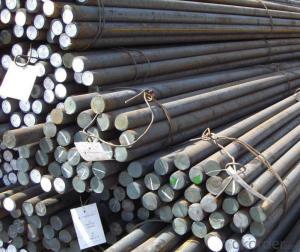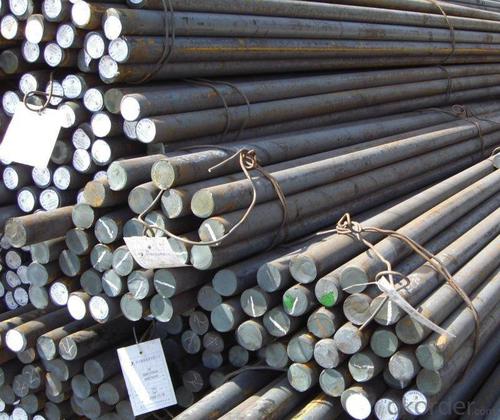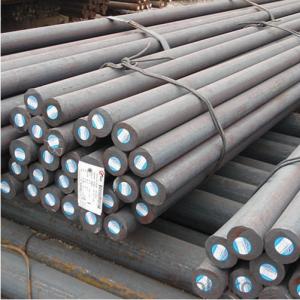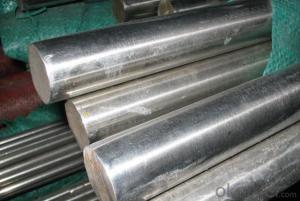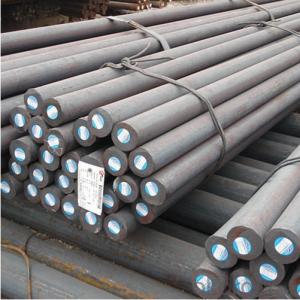50Mn Alloy Steel Round Bar of CNBM 16-300MM
- Loading Port:
- Shanghai
- Payment Terms:
- TT OR LC
- Min Order Qty:
- 25 m.t.
- Supply Capability:
- 50000 m.t./month
OKorder Service Pledge
OKorder Financial Service
You Might Also Like
Specification
Alloy round steel bar 50Mn
Product Description
1. Steel Grade: AISI 1045, 45#, C45, S45C
2. Diameter: 16mm-300mm
3. Length: 6m-12m
4. Shape: Round bar, flat bar, square bar
5. Technique: Hot rolled, cold drawn
Specification:
Material | 50Mn | Round bar | Dia(mm) | 16-600 |
Process | EAF + LF + VD + Forged + Heat Treatment (optional) | Length (mm) | Max 12000 | |
Heat treatment | Normalized / Annealed / Quenched / tempered | Flat bar | Thickness(mm) | 8-500 |
Delivery condition | Hot forged +Rough machined (black surface after Q/T)+ Turned (optional) | Width(mm) | 70-200 | |
Test | Ultrasonic test according to SEP 1921-84 D/d | Length (mm) | Max 12000 |
Chemical Composition
C | Si | Mn | Cr | Ni | Cu |
0.5~0.8 | 0.17~0.37 | 0.25~1.2 | ≤0.25 | ≤0.30 | ≤0.25 |
Packing and Delivery:
Packing in bundle package or as your requriements.
Delivery Detail: About 45 days after confirming order.
Usage and Applications
1. Steel round bar is used in a large number of architectural and engineering structures. Or it can be used in construction of plants for the production of steel house frames, high-voltage transmission towers, bridges, vehicles, boilers, containers, ships, etc.
2. And we can use this kind of product on the performance of the mechanical parts if the demand is not very high.
3. Some especial material steel round bar can be used for main shaft of steamer, hummer shank, with big section and supper force.
Product Show
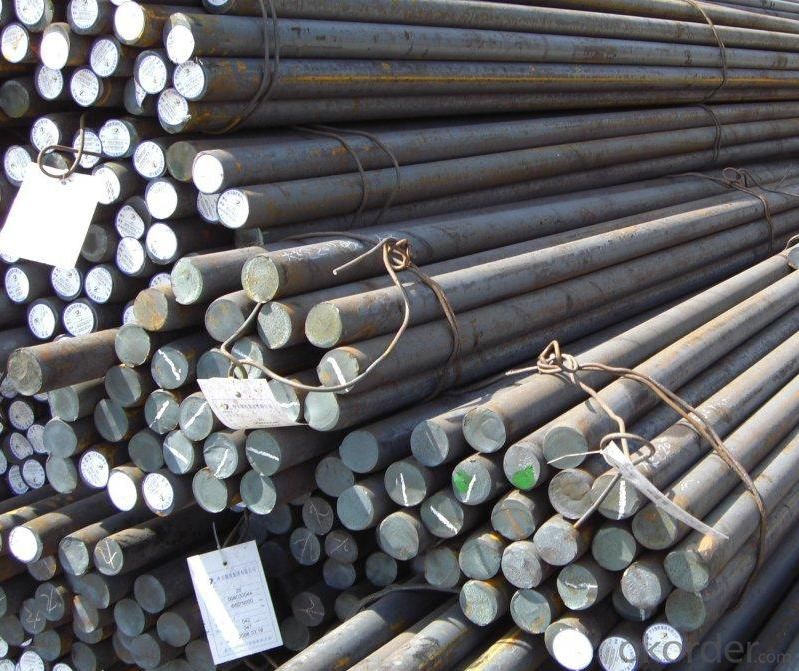
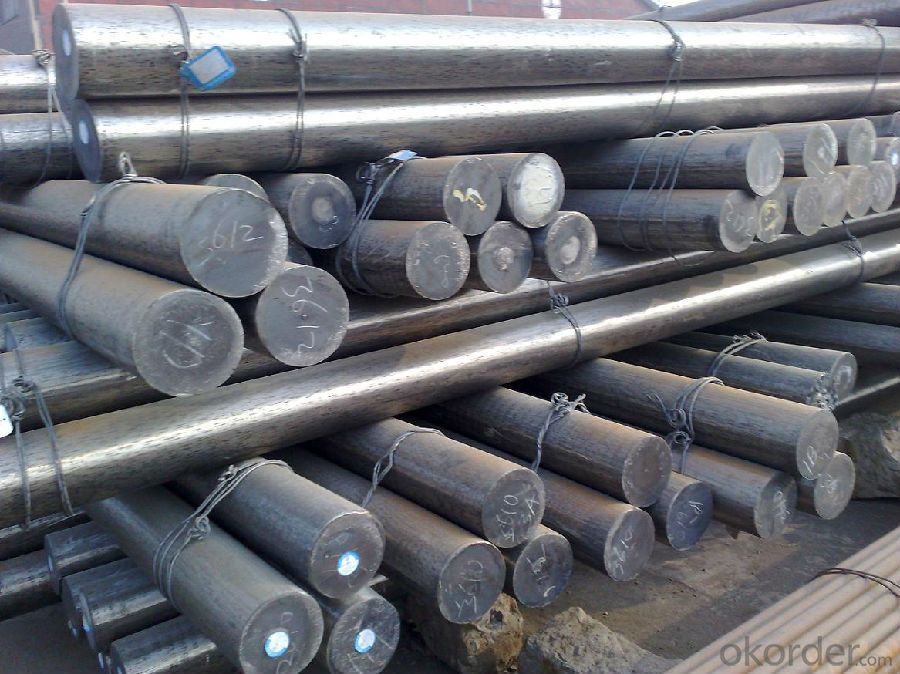
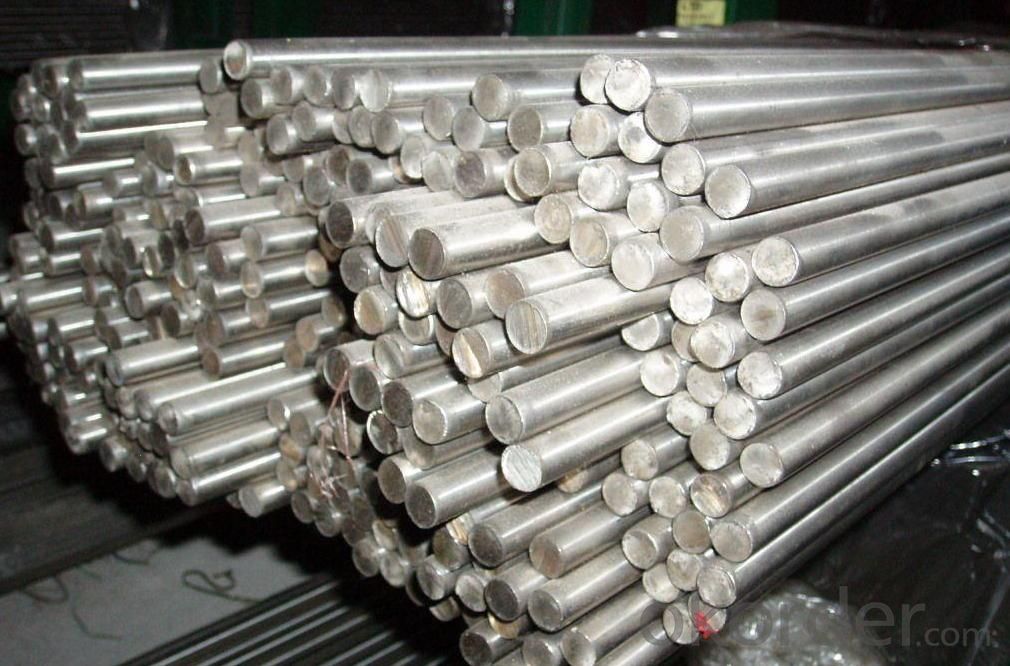
- Q: What are the different surface finishing techniques used for special steel?
- There are several surface finishing techniques used for special steel, including electroplating, passivation, pickling, and powder coating. Electroplating involves depositing a thin layer of metal onto the steel surface to enhance its appearance and provide corrosion resistance. Passivation is a chemical process that removes surface contaminants and forms a protective oxide layer on the steel, preventing corrosion. Pickling involves using acid solutions to remove surface impurities and oxide layers, resulting in a clean and smooth surface. Powder coating is a technique where a dry powder is applied electrostatically to the steel surface and then cured under heat, creating a durable and decorative coating.
- Q: How is special steel used in the mining manufacturing process?
- Special steel is used in the mining manufacturing process for various applications. It is commonly utilized in the construction of mining equipment such as drilling machines, excavators, and crushers due to its high strength and durability. Special steel is also used to make wear-resistant components for mining machinery, ensuring their longevity in harsh operating conditions. Additionally, special steel is employed to manufacture conveyor belts, pipes, and structural supports needed in mining operations. Overall, the use of special steel in the mining manufacturing process enhances the efficiency, reliability, and safety of mining equipment and infrastructure.
- Q: What are the different methods of testing the mechanical properties of special steel?
- Special steel can be tested for its mechanical properties using several methods. These methods aim to determine characteristics such as strength, hardness, ductility, and more. Some commonly used methods include: 1. Tensile Testing: The tensile strength of steel is determined using this method. A sample is subjected to an increasing tensile force until it breaks. The force and elongation measurements are then used to calculate properties like ultimate tensile strength, yield strength, and elongation. 2. Hardness Testing: This method measures the steel's resistance to indentation or scratching. Popular hardness tests include Rockwell, Brinell, and Vickers hardness tests. They provide information about the steel's ability to withstand deformation, wear, or penetration. 3. Impact Testing: This method assesses the steel's ability to absorb energy during sudden impact or shock loading. The impact toughness of steel is often measured using tests like Charpy and Izod. These tests involve striking a notched sample with a pendulum and measuring the energy absorbed during fracture. 4. Bend Testing: This method evaluates the steel's ductility and flexibility. A sample is bent to a specific angle or radius until it fractures. The bend test helps determine the steel's ability to endure bending or forming processes without failure. 5. Fatigue Testing: This method examines the steel's resistance to repeated cyclic loading. Fatigue tests involve subjecting a sample to varying levels of stress for a specified number of cycles until it fails. This helps determine the steel's endurance limit and fatigue strength. 6. Microhardness Testing: This technique measures the hardness of small localized areas on the steel's surface. It is useful for evaluating surface treatments, case hardening, and the effects of heat treatment. 7. Non-Destructive Testing (NDT): These methods allow for testing without causing damage to the steel. Common NDT techniques include ultrasonic testing, magnetic particle testing, eddy current testing, and radiographic testing. NDT methods are used to detect internal defects, cracks, or discontinuities that may affect the steel's mechanical properties. These different testing methods provide valuable information about the mechanical properties of special steel. They assist in quality control, material selection, and ensuring that the steel meets required standards and specifications.
- Q: What are the different welding techniques for special steel?
- There are several different welding techniques used for special steel, including shielded metal arc welding (SMAW), gas tungsten arc welding (GTAW), gas metal arc welding (GMAW), and submerged arc welding (SAW). Each technique offers unique advantages and is chosen based on factors such as the type of special steel being welded, the desired weld quality, and the specific requirements of the project.
- Q: What are the thermal conductivity properties of special steel?
- The thermal conductivity properties of special steels, also known as alloy steels, can differ based on their composition and specific heat treatment. The range of thermal conductivity for special steel is generally between 10 and 50 W/mK. The carbon content, alloying elements, and microstructure primarily influence the thermal conductivity of steel. Carbon acts as a thermal conductor, thus increasing the thermal conductivity of steel. However, alloying elements like chromium, nickel, and molybdenum have lower thermal conductivity than iron, which can reduce the thermal conductivity of steel. Furthermore, the microstructure of special steel plays a crucial role in determining its thermal conductivity. Heat treatments like quenching and tempering can modify the microstructure, thereby affecting the thermal conductivity. For instance, steels with higher carbon content and a martensitic microstructure generally have higher thermal conductivity compared to steels with lower carbon content and a ferritic or pearlitic microstructure. It is important to consider that factors such as impurities, grain size, and the presence of defects can also influence the thermal conductivity of special steel, either enhancing or reducing it. In conclusion, the thermal conductivity properties of special steel can vary depending on its composition, heat treatment, and microstructure. Therefore, it is crucial to take these factors into account when evaluating the thermal conductivity of special steel for specific applications.
- Q: How does special steel resist corrosion?
- Special steel resists corrosion through the addition of alloying elements, such as chromium, which form a protective oxide layer on its surface. This oxide layer acts as a barrier, preventing the underlying steel from coming into contact with corrosive substances and effectively inhibiting corrosion.
- Q: Can special steel be used in the aerospace parts manufacturing industry?
- Yes, special steel can be used in the aerospace parts manufacturing industry. Special steel alloys, such as stainless steel and titanium alloys, possess properties like high strength, corrosion resistance, and heat resistance, making them suitable for use in critical aerospace components like engine parts, landing gears, and structural elements. Their ability to withstand extreme conditions, along with their lightweight nature, makes special steel a preferred choice in the aerospace industry to ensure safety, durability, and optimum performance of aircraft.
- Q: How does special steel resist wear and tear?
- Special steel resists wear and tear due to its unique composition and manufacturing process. It is made with a higher percentage of alloying elements such as chromium, nickel, and molybdenum, which enhance its hardness, strength, and corrosion resistance. This increased hardness enables the steel to withstand abrasion, friction, and impact, making it highly durable and resistant to wear and tear. Additionally, special steel undergoes specialized heat treatments and mechanical processes that further enhance its toughness and resistance to deformation, contributing to its ability to withstand harsh and demanding conditions without significant deterioration.
- Q: How does special steel contribute to the manufacturing of springs for automotive applications?
- Special steel plays a crucial role in the manufacturing of springs for automotive applications due to its unique properties and characteristics. Springs are essential components in automobiles as they provide the necessary suspension and shock absorption, ensuring a smooth and comfortable ride. One of the key advantages of special steel in spring manufacturing is its high strength and durability. Springs are subject to constant stress and repetitive loading, and special steel, with its exceptional strength, can withstand these forces without deforming or breaking. This property ensures that the springs can function reliably and maintain their shape and performance over extended periods of use. Additionally, special steel offers excellent fatigue resistance, which is vital for springs in automotive applications. Fatigue occurs when a material weakens and eventually fails after repeated loading and unloading cycles. Special steel is specifically designed to withstand fatigue, allowing the springs to endure the constant pressure and stress without experiencing premature failure. Moreover, special steel provides superior corrosion resistance, which is particularly important for automotive springs. Cars are exposed to various environmental elements, including moisture, road salt, and chemicals, which can lead to corrosion and deterioration of the springs. By using special steel with enhanced corrosion resistance, manufacturers can ensure that the springs have a longer lifespan and maintain their performance even in harsh conditions. Furthermore, special steel offers versatility in terms of its composition and properties. Manufacturers can choose from a wide range of special steel alloys, each with its own unique characteristics, to meet specific requirements. For example, some alloys offer greater elasticity, allowing the springs to flex and absorb shocks more effectively. Others provide higher hardness, enhancing the springs' load-bearing capacity. This flexibility in material selection empowers manufacturers to design and produce springs that are tailored to the specific needs of automotive applications. In conclusion, special steel significantly contributes to the manufacturing of springs for automotive applications by providing high strength, durability, fatigue resistance, corrosion resistance, and versatility. These properties enable the production of reliable, long-lasting springs that ensure optimal suspension, shock absorption, and overall performance in vehicles.
- Q: What are the main factors affecting the fracture toughness of special steel?
- The fracture toughness of special steel can be affected by several key factors, encompassing: 1. Alloy composition: The fracture toughness of the steel can be greatly influenced by its specific chemical composition, including the type and amount of alloying elements. Elements like chromium, nickel, and molybdenum have the potential to enhance toughness by promoting the formation of fine-grained microstructures or improving the steel's ability to resist crack propagation. 2. Heat treatment: Determining the fracture toughness of the steel is heavily reliant on the temperature and duration of the heat treatment process, as well as the subsequent cooling. Proper heat treatment can refine the microstructure and eliminate any potential defects, thereby enhancing the steel's resistance to fracture. 3. Microstructure: The fracture toughness of the steel is profoundly impacted by its microstructure, encompassing grain size and distribution, phase composition, and the presence of inclusions. Generally, finer-grained structures exhibit higher toughness due to their improved resistance to crack propagation. 4. Existence of defects: The presence of defects, such as cracks, voids, or inclusions, within the steel can act as stress concentrators, ultimately diminishing its fracture toughness. These defects can initiate cracks and facilitate their propagation, ultimately leading to reduced toughness. 5. Temperature: Fracture toughness is contingent upon temperature, and the behavior of special steel can significantly vary at different temperature ranges. Some steels exhibit improved toughness at lower temperatures due to microstructural transformations, while others may experience decreased toughness at elevated temperatures due to material softening. 6. Loading conditions: The fracture toughness of special steel can also be impacted by the loading conditions, including the rate of loading or the presence of dynamic loading. Higher loading rates or dynamic loading can result in reduced toughness, as the steel may not have sufficient time to deform and absorb energy before fracturing. 7. Mechanical properties: The mechanical properties of the steel, such as strength, hardness, and ductility, can influence its fracture toughness. Higher strength and hardness can sometimes lead to decreased toughness, as the material becomes more brittle. However, a balance between strength and toughness can be achieved by carefully selecting the alloy composition and heat treatment parameters. In summary, the fracture toughness of special steel is determined by a complex interplay of various factors, including alloy composition, heat treatment, microstructure, defects, temperature, loading conditions, and mechanical properties. By optimizing these factors, the fracture toughness of special steel can be enhanced for specific applications.
Send your message to us
50Mn Alloy Steel Round Bar of CNBM 16-300MM
- Loading Port:
- Shanghai
- Payment Terms:
- TT OR LC
- Min Order Qty:
- 25 m.t.
- Supply Capability:
- 50000 m.t./month
OKorder Service Pledge
OKorder Financial Service
Similar products
Hot products
Hot Searches
Related keywords
